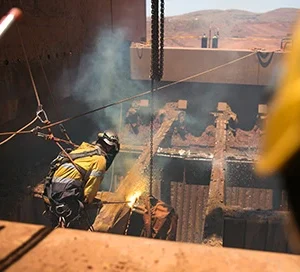Skills Certified can assist you in this journey through Recognition of Prior Learning (RPL), turning your experience into formal qualifications that boost your career prospects.
Essential tips for career advancement in concreting
1. Master your craft
Continual improvement in your technical skills is crucial.
- Stay updated with the latest techniques and technologies in concreting to ensure high-quality work and increased efficiency.
- Engage in regular practice and seek feedback from peers and mentors to refine your skills.
- Embrace new methods and innovations in the field to stay ahead of the curve and provide superior services.
- Consider specialising in niche areas of concreting, such as decorative finishes or environmentally sustainable practices, to differentiate yourself from competitors and attract a broader range of clients.
2. Pursue further education
Enrol in courses and workshops to expand your knowledge and skills. Advanced training in areas like decorative concreting, project management, and safety standards can set you apart. Consider obtaining certifications in specialised areas of concreting to enhance your expertise and marketability.
Further education not only improves your technical abilities but also demonstrates your commitment to professional growth. Seek out opportunities for mentorship or apprenticeships under experienced professionals to gain practical insights and hands-on experience that can significantly enhance your competence and confidence.
3. Obtain formal qualifications
The RPL process allows you to gain formal recognition for your existing skills and experience, enhancing your credibility and opening doors to new opportunities.
Formal qualifications can make you more competitive in the job market and increase your chances of securing higher-paying positions. They also provide a structured framework for your knowledge, ensuring you meet industry standards. In addition, having formal qualifications can give you the confidence to take on more complex projects and leadership roles, as it validates your expertise and skills.
4. Network with industry professionals
Join professional associations, attend industry events, and engage with other concreters. Networking can provide valuable insights, support, and opportunities for career growth. Building relationships with industry leaders and peers can lead to mentorship opportunities, collaborations, and job referrals.
Networking also keeps you informed about industry trends and developments, helping you stay relevant. Participate in online forums and social media groups related to concreting to expand your network and stay connected with the latest discussions and innovations in the field.
5. Seek out leadership roles
Take on supervisory roles or lead projects to demonstrate your leadership capabilities. This experience is invaluable for career progression. Developing leadership skills such as team management, decision-making, and strategic planning can prepare you for higher-level positions.
Leading projects showcases your ability to handle responsibility and drive successful outcomes, making you a strong candidate for advancement. Additionally, consider volunteering for leadership roles in industry associations or community projects to further demonstrate your leadership potential and commitment to the trade.
Building a strong professional reputation
6. Deliver quality work consistently
Your reputation is built on the quality of your work. Strive for excellence in every project to earn the trust and respect of clients and colleagues. High standards of workmanship lead to satisfied clients who are likely to provide positive references and repeat business.
Consistency in delivering quality work establishes you as a reliable and skilled professional in the industry. Always seek to exceed client expectations by paying attention to detail and maintaining a strong work ethic.
7. Communicate effectively
Clear and professional communication with clients, team members, and stakeholders ensures smooth project execution and fosters positive relationships.
Effective communication helps prevent misunderstandings and ensures that everyone is aligned with project goals and expectations. It also enhances your ability to negotiate, resolve conflicts, and build strong working relationships. Regularly updating clients on project progress and being transparent about any challenges or changes can build trust and strengthen your professional relationships.
8. Stay organised
Efficient project management and organisational skills are essential for meeting deadlines and managing resources effectively. Being organised allows you to plan and execute projects systematically, reducing the risk of errors and delays.
Use tools and techniques such as project management software, checklists, and time management strategies to stay on top of your tasks and responsibilities. Developing a system for tracking your work, scheduling tasks, and managing resources can significantly improve your productivity and project outcomes.
By mastering your craft, pursuing continuous learning, and leveraging the RPL process with help from Skills Certified, you can advance your career in concreting, climbing the ladder to greater success and satisfaction.
Consistently delivering quality work, communicating effectively, and staying organised will help you build a strong professional reputation, opening more opportunities for career growth. Embrace every opportunity to learn and grow and stay committed to excellence in all aspects of your work.
















